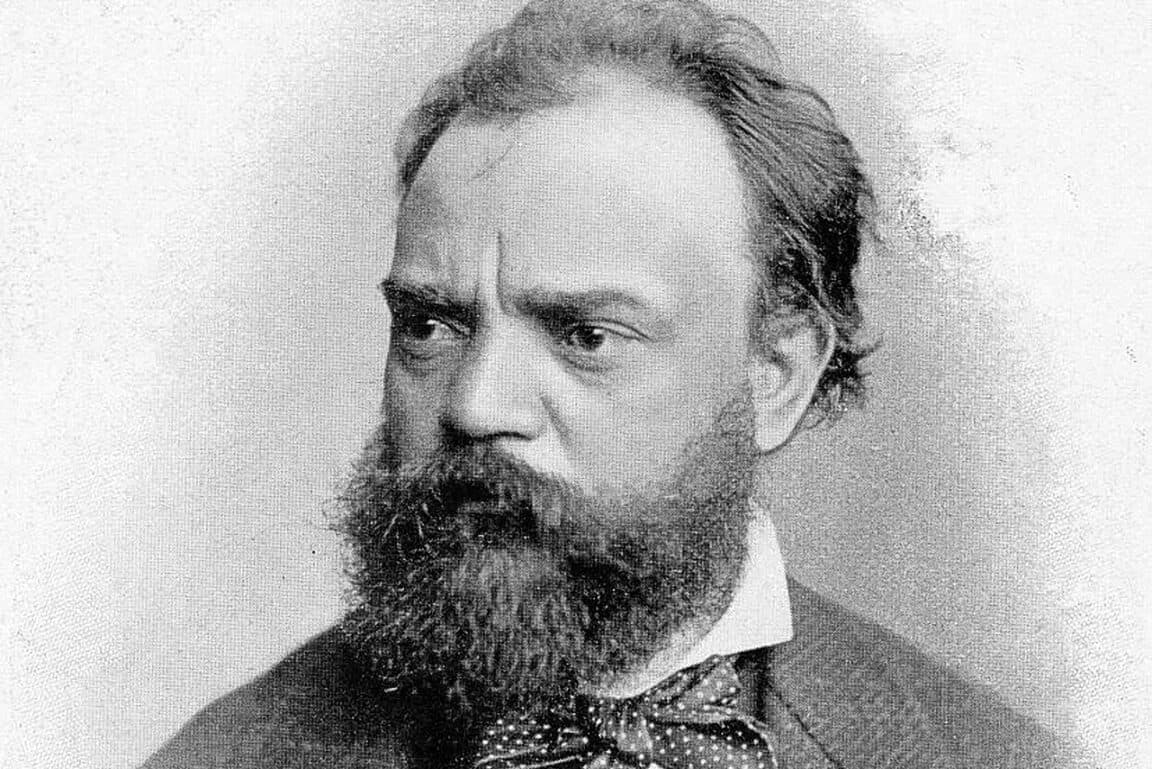What do you know about the musical expressions of Slavic dance forms like the skočná, the odzemek, or the furiant? Would you like to know more? Would you like to hear them in the work of one of the world’s greatest and most beloved composers, played by world-class chamber musicians? If so, you need to get tickets for the Dvořák Festival presented Nov. 5-13 by Friends of Chamber Music. The five concerts will be supplemented by several free community events.
DVOŘÁK FESTIVAL

The internationally recognized Martinů Quartet will perform a variety of Dvořák’s chamber music in a series of five concerts at Portland State University’s Lincoln Hall Nov. 5-13. The Quartet’s members will be joined by guest artists Karel Košárek, piano, Hannah Penn, mezzo-soprano, and Kenji Bunch, viola. The Martinů has performed here once before, in April 2015, at which time the Quartet honored the Portland resident and Czech/American composer Tomas Svoboda by playing one of his works. The Dvořák festival follows a series of festivals presented by Friends of Chamber Music, beginning with Shostakovich by the Jerusalem Quartet in 2013; Bartok/Beethoven, also by the Jerusalem in 2016; and a Beethoven Festival performed by the Pacifica Quartet in 2018. This festival has been postponed twice because of Covid, but this time it will happen. It will be dedicated to the memory of Suzanne Rague, long-time supporter of the arts in Oregon, and one of the initiators of the Dvořák Festival idea.
Leading off the festival will be Dr. David Beveridge, a musicologist specializing in the music and life of Antonín Dvořák, who will present two free lectures on the composer and his music on Nov. 5 and a pre-concert talk on Nov. 6, and who has contributed some very readable program notes for each concert. The festival will also include several other free events: a panel discussion, a master class, and two films to be shown at the 5th Avenue Cinema. Stay tuned for an interview with a member of the Martinů Quartet in an upcoming issue of Oregon ArtsWatch.
Dr. Beveridge was kind enough to spend the better part of an hour on a Zoom call with ArtsWatch. This interview and his article, Antonín Dvořák: His life, his music, his legacy, published by the Dvořák American Heritage Association in New York, have contributed significantly to this preview. Also helpful has been a series of video lectures about Dvořák’s life and music by Kimberlee Uwate, violist with the Delgani Quartet.
David Beveridge’s love affair with Dvořák was sealed while he was writing his doctoral dissertation at the University of California, Berkeley. After teaching on the college level for several years, he moved permanently to the Czech Republic in 1993, where he works as a musicologist, writer, and translator. He is working on a book about Dvořák’s relationship with the British, as well as a comprehensive new book about the composer’s life and music. The existing major work on Dvořák is in the Czech language and dates from the 1950s. Beveridge’s new work will include much unpublished source material as well as current information.
WHY TOTAL IMMERSION?
One could ask why anyone would sign up for five concerts of seventeen pieces, all by the came composer. (Single concert tickets will, of course, be available, but there’s a discount for the series). Well, for several reasons. For one, there will be a variety of instrumentation in these programs. The piano will feature in a trio, quartet, and quintet; there will be a string trio, viola quintet, pieces for cello and piano, and a vocal piece, the Gypsy Songs, that will include the familiar “Songs My Mother Taught Me.” Through the progression of concerts and lectures, the listener will be able to witness changes and growth in the composer’s works. For example, listeners will hear the Piano Quintet No. 1 in A major Op. 5 on Friday, Nov. 11, and then Piano Quintet No. 2 in A major, Op. 81 on Sunday Nov. 13, composed many years later. While the earlier piece was well-received at the time, the later work contains more of the folk-melody influence that characterized the composer’s later work and was much more popular — same instrumentation, same key, but much different.
The most important reason for coming is the music itself, which is full of beautiful melodies, cheerful dance tunes and vibrant rhythms, as well as some very non-programmatic and, at times, very intense “classical,” or what Beveridge calls “cosmopolitan,” music. In this regard Dvořák stands next to Beethoven, Mendelssohn, Schumann, and other composers of the 19th Century in the complexity and sophistication of his works. Yet one reason for his popularity is the vigorous, rustic elements of the Slavic dance themes, which are often perceived as simple or peasant-like, and descriptive of the composer’s upbringing.
UP FROM HIS ROOTS
Dvořák did indeed come from the peasant class in Bohemia, which is now the Czech Republic. His father was a tavern owner and butcher who liked music and loved to play the zither. Unlike the fathers of many other composers of that era, he encouraged the musical abilities of his son. However, education for poor children in those times was difficult, and the Czech language was suppressed by the Habsburg Empire, so all of his classes were in German. Fortunately, Dvořák was supported by a series of scholarships. He was hard-working, determined, and self-critical as he composed for many years without any financial support. Eventually he was discovered by Johannes Brahms, who introduced him to his own publisher, so it wasn’t until Dvořák was 37 years old that he finally began to be paid for his compositions.
Interestingly, many of his early compositions were quite abstract. Beveridge points out that some of Dvořák’s early quartets were very experimental and dissonant and that they sound as if they could have been composed by Schoenberg, who was born after Dvořák had written those works. Dvořák later destroyed many of his earliest works, but fortunately they survive in the form of parts for the four instruments, although they are rarely played.
STYLE: COSMOPOLITAN OR SLAVIC?

When asked about the composers that were most influential to Dvořák’s work, he would always refer to the Germanic ones: Bach, Mozart, Beethoven, and Schubert, and his preferred style of composition was the classical or cosmopolitan one, although his listeners preferred the pieces that included lively Slavic melodies. Several of his quartets contain titles of peasant dances or themes. In his E-flat major piano quartet, unofficially known as the “Slavonic” quartet, the second movement is entitled Dumka, a Ukrainian word that refers to a sad or melancholic folk theme, and that Dvořák himself said “cannot be translated.”
One of his most popular compositions is the Piano Trio in E minor, Op. 90, nicknamed the Dumky (plural of Dumka), a long meditation in six movements — sunny and dance-like in some parts, alternating with sections of melancholy, all distinctly Slavic. In other compositions you can find movements named after the Furiant, whose tempo is as lively as you might expect, and then there’s the Hungarian csárdas. Not all of these folk melodies are Czech. According to Beveridge, Dvořák’s first use of a folk melody was actually an Irish tune. While it seems obvious that Dvořák enjoyed composing works that used these lively dances, nearly all of these pieces were commissions rather than spontaneous efforts. And yet those with folk influence were wildly popular, both with his fellow Czechs, and also in Vienna, Berlin, and London.
MISCONCEPTIONS

As a scholar of Dvořák’s life as well as his music, Beveridge lists three popular misconceptions about the composer. First, that he was mainly an instrumental composer, when, in fact, he composed a considerable number of vocal works, including oratorios and operas, the most famous of which is the very popular Rusalka. A second misconception is that Dvořák is known mainly as a nationalist composer during the time the Czechs were struggling to free themselves from Habsburg domination to create their own cultural identity. While Dvořák was a patriotic Czech, he identified as a cosmopolitan composer, and in a letter to a friend he stated his motto as “God, Love, and Country,” in that order. The third misconception is that the primary characteristic of Dvořák’s music is the cheerful, earthy, peasant element, and that his music is simple and happy. The complexity and sophistication of much of his music, as well as its dark and passionate moments, give the lie to this theory.
Dvořák’s was not always a happy life. Widespread recognition took a long time to happen. He and his family barely managed to stay afloat until Brahms enabled him to become financially self-sufficient, and later, even wealthy. Although he was happily married, the death of his first three children must have contributed to some of the dark moments in his music. Moreover, contemporary musicologists have discovered that Dvořák suffered from agoraphobia. He was afraid to travel or even to go outside alone, and usually managed to have a friend or family accompany him on his tours.
DVOŘÁK AND AMERICAN MUSIC

Despite his fears, Dvořák accepted an offer from the New York philanthropist Jeannette Thurber to come to the U.S. as a composition teacher and director of the newly formed National Conservatory of Music of America. He soon became embroiled in the controversy about the future character of American music and his potential role in contributing to it. He had become very interested in what were then called Negro spirituals, which he often asked his favorite student, Harry Burleigh, to sing for him.
During his two years in America Dvořák visited the small town of Spillville, Iowa, home to a group of Bohemian expatriates, where he delighted in the rural countryside and often walked in the woods (alone). There he was exposed to some Native American songs and dances. That same summer he visited several other American cities, and around that time experienced Buffalo Bill’s Wild West Show in New York.
Dvořák publicly acknowledged the influence of Black and American Indian music on his compositions, although he stressed that he used the spirit of this music and did not quote actual melodies. For example, Beveridge points out the suggestion of “blues” in the String Quartet in A flat, Op. 105. By the same token, Dvořák’s music definitely influenced the development of American music, through his students from the National Conservatory, and specifically through their students: Duke Ellington, Charles Ives, Aaron Copland, and George Gershwin. It was in the U.S. that Dvořák composed his iconic Ninth Symphony, “From the New World.”
After returning to his native Bohemia in 1895, Dvořák stopped composing string quartets and concentrated on symphonic poems and opera. By this time he was immensely popular and the world was shocked by his death in 1904 at the age of 62.
Friends of Chamber Music has provided us an amazing opportunity — to hear a variety of Dvořák’s chamber works played by the internationally renowned Martinů Quartet and to learn about the composer and his works from a musicologist specializing in Dvořák. It’s one not to miss.



